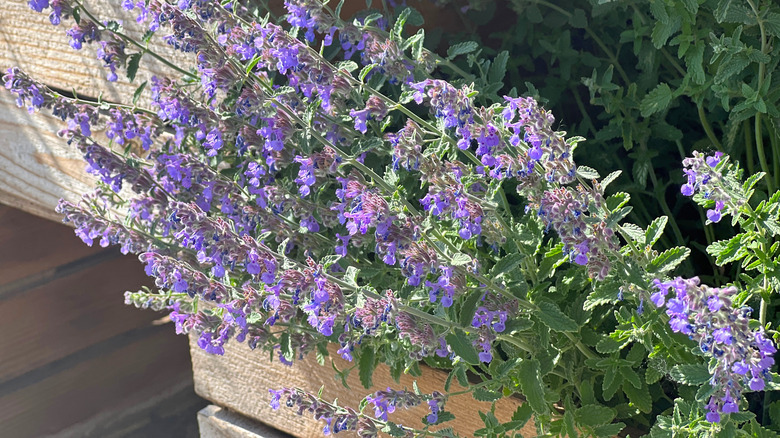The Drought-Tolerant Plant That's Said To Send Mice Running From Your Garden
No one wants to see mice foraging around their backyard, and it is only a matter of time before they try to make their way inside. A quick dip in temperatures can easily send the furry creatures scurrying for shelter from the cold. One way to keep these rodents out of your yard is to plant catnip, which can repel food sources for mice and attract their predators.
While chemically laden pesticides work to keep mice and rats away from your home, many would rather go with a safer solution. This is especially true when you have pets and children, or if you would just rather keep clear of harmful chemicals. Of course, the first thing you want to do is keep your yard neat and tidy to discourage mice from hanging around. Dispose of garbage promptly and don't allow leftover food, wood piles, or clutter to gather outside — this is a common lawn care mistake that attracts mice to your yard. Once clean, you can focus on planting catnip.
Why catnip works at reducing backyard mice
Growing catnip can be a good idea to deter mice from your garden for a couple of reasons. For starters, catnip contains a compound called nepetalactone, which is known to repel some mosquitoes, fruit flies, and other insects. That's relevant because rodents can feed on small insects and their larvae. Eliminating these food sources will make your garden less attractive to mice.
However, possibly the biggest draw in growing catnip to keep mice out of your yard is that its compounds are attractive to cats. Nepetalactone naturally causes felines to be drawn to the area where the catnip is growing. Anyone who has ever had a catnip-loving feline knows how they simply cannot get enough of the scent and will hunt down locations where they can smell it. Since cats are natural predators of mice, having more of them around your garden can help keep mouse populations in check. Mice also tend to avoid areas where they can sense and smell cats.
More benefits of catnip in the yard
While planting catnip can help control backyard mice, it also has value as a companion plant and can further protect your garden plants from damage due to insect infestations. Its pungent aroma acts as a natural insect deterrent, protecting vegetables from aphids and your yard from ants, cockroaches, and flies. It can even help keep Japanese beetles away.
Beyond keeping pests at bay, catnip is also a gardener's dream in terms of care, and it doesn't take a whole lot to successfully grow one of the plants. It is drought-resistant and thrives in sunny spots with well-drained soil. It also needs minimal watering and attention once established, so you can almost plant it and forget about it. However, keep in mind that catnip can spread easily, so consider planting it in a contained space if you don't want it to take over your garden.


